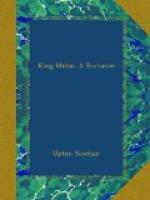“Well, sir, you’ve treated me nicely!” she exclaimed, showing her vexation in spite of herself.
“You will forgive me,” said Arthur, smiling.
“Don’t be too sure of it,” Helen said; “I looked for you everywhere, and I am quite angry.”
“I was obeying your high command,” the other replied, still smiling.
“My command? I told you to wait for me.”
“You told me something else,” laughed Arthur. “You spent all the morning instructing me for it, you know.”
“Oh!” said Helen. It was a broad and very much prolonged “Oh,” for a sudden light was dawning upon the girl; as it came her frown gave place to a look of delight.
“You have been writing me a poem!” she cried, eagerly.
“Yes,” said Arthur.
“Oh, you dear boy!” Helen laughed. “Then I do forgive you; but you ought to have told me, for I had to walk home all alone, and I’ve been worrying about you. I never once thought of the poem.”
“The muses call without warning,” laughed Arthur, “and one has to obey them, you know.”
“Oh, oh!” exclaimed the other. “And so you’ve been wandering around the woods all this time, making verses! And you’ve been waving your arms and talking to yourself, and doing all sorts of crazy things, I know!” Then as she saw Arthur flush, she went on: “I was sure of it! And you ran away so that I wouldn’t see you! Oh, I wish I’d known; I’d have hunted you up and never come home until I’d found you.”
As was usual with Helen, her momentary vexation had gone like April rain, and all her seriousness had vanished with it. She forgot all about the last scene in the woods, and Arthur was once more the friend of her girlhood, whom she might take by the hand when she chose, and with whom she might be as free and happy as when she was alone with the flowers and the wind. It seemed as if Arthur too had vented all his pent up emotion, and returned to his natural cheerful self.
“Tell me,” she cried, “did you put in all the things I told you about?”
“I put all I could,” said Arthur. “That is a great deal to ask.”
“I only want it to be full of life,” laughed Helen. “That’s all I care about; the man who wants to write springtime poetry for me must be wide awake!”
“Shall I read it to you?” asked Arthur, hesitatingly.
“Yes, of course,” said Helen. “And read it as if you meant it; if I like it I’ll tell you so.”
“I wrote it for nothing but to please you” was the reply, and Arthur took a much bescrawled piece of paper from his pocket; the girl seated herself upon the piano stool again and gazed up at him as he rested his elbow upon the top of the piano and read his lines. There could not have been a situation in which the young poet would have read them with more complete happiness, and so it was a pleasure to watch him. And Helen’s eyes kindled, and her cheeks flushed brightly as she listened, for she found that the verses had taken their imagery from her very lips.




